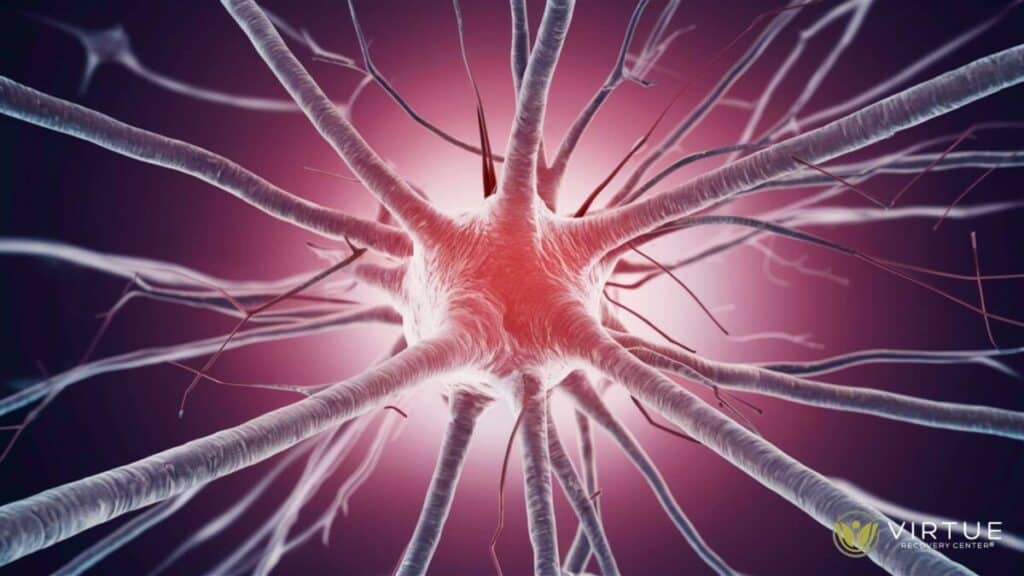Adaptive myelination plays a role in opioid addiction by potentially affecting the neural circuits involved in addiction behaviors. Myelination, which helps in the efficient transmission of neural signals, can be altered by repeated drug use, affecting the brain’s reward system and potentially influencing the susceptibility to or severity of addiction. Understanding changes in myelination due to opioid use could offer insights into new therapeutic targets for addiction treatment.
Key Takeaways
- Overview of Adaptive Myelination: Adaptive myelination refers to the process by which myelin sheaths adjust in response to neural activity. This myelination is crucial for brain function and plasticity, influencing learning and memory.
- Impact on the Brain’s Reward Circuitry: Adaptive myelination plays a significant role in the brain’s reward circuitry, particularly in regions like the ventral tegmental area, which is involved in reward learning and reinforcement.
- Connection to Opioid Addiction: Opioid use affects myelination processes, leading to changes in the brain that contribute to addiction. Understanding these changes can help develop better treatments for opioid addiction.
- Key Findings from Recent Research: Studies from institutions like Stanford University have highlighted how adaptive myelination and new oligodendrocyte formation are involved in opioid addiction.
- Importance of Understanding Myelination in Addiction Treatment: Comprehensive knowledge of adaptive myelination can inform new strategies for treating opioid use disorder and improving brain health.
Introduction
Adaptive myelination is an essential process in the brain, where myelin sheaths adapt in response to neural activity, supporting learning and memory. Understanding its role in opioid addiction is crucial as it sheds light on how opioid use affects the brain’s reward circuitry. This article explores adaptive myelination’s impact on opioid addiction, its connection to brain function, and implications for addiction treatment.
Understanding Adaptive Myelination
What is Adaptive Myelination?
Adaptive myelination is the process where myelin sheaths in the brain adjust in response to neural activity. Unlike developmental myelination, which occurs mainly during early growth, adaptive myelination continues throughout life, supporting brain plasticity and cognitive functions. It plays a vital role in how our brain adapts to new experiences and learning.
The Myelination Process and Myelin Plasticity
Myelination involves the formation of myelin sheaths around axons by oligodendrocytes. This process enhances the speed and efficiency of neural transmission. Myelin plasticity refers to the ability of these myelin sheaths to change in response to activity. This experience-dependent myelination ensures that our brain remains flexible and capable of learning throughout life.
The Brain and Myelination
Role of Myelin in the Brain
Myelin is crucial for the proper functioning of neurons. It insulates axons, allowing for faster transmission of electrical impulses. This insulation speeds up communication within the brain and protects axons from damage. Healthy myelination is essential for maintaining efficient brain communication and overall brain health.
Importance of Myelination in Healthy Brain Function
In a healthy brain, myelination supports cognitive functions such as learning and memory. It helps maintain neural networks and prevents neurodegenerative diseases. When myelination is disrupted, it can lead to cognitive impairments and conditions like multiple sclerosis. Therefore, understanding and maintaining myelination is critical for brain health.
Adaptive Myelination and the Reward Circuitry
How Adaptive Myelination Affects Reward Learning
Adaptive myelination significantly impacts the brain’s reward learning processes. It affects neural pathways involved in reward processing and reinforces behaviors. Dopamine signaling, which is crucial for reward learning, is influenced by myelination, highlighting its importance in developing and maintaining rewarding behaviors.
Involvement of the Ventral Tegmental Area and Other Brain Regions
The ventral tegmental area (VTA) is a key region involved in the brain’s reward circuitry. Adaptive myelination in the VTA and other brain regions like the nucleus accumbens and prefrontal cortex affects reward processing. These regions work together to regulate reward learning and reinforcement, and changes in myelination here can impact addiction development.
Opioid Addiction and Brain Changes
Impact of Opioid Use on Myelination
Opioid use has a profound impact on myelination. Chronic use can alter myelin plasticity, leading to changes in brain structure and function. These changes are often seen in brain regions involved in reward and addiction, such as the VTA and nucleus accumbens. Opioids disrupt the normal myelination process, affecting neurons and their communication pathways.
Changes in Myelin Sheaths and Neurons Due to Opioid Use
Opioid use can lead to significant changes in myelin sheaths, impacting neuron function and brain communication. This disruption in myelination can contribute to addictive behaviors by altering how the brain processes rewards and reinforcements. Understanding these changes is crucial for developing effective treatments for opioid addiction.
Key Research Findings
Recent Studies on Adaptive Myelination and Opioid Addiction
Recent studies have provided valuable insights into the relationship between adaptive myelination and opioid addiction. Research involving mouse models has shown how opioids affect myelination and brain plasticity. Institutions like Stanford University have conducted extensive research, highlighting the role of new oligodendrocyte formation in addiction.
Contributions from Stanford University and Other Research Institutions
Stanford University and other research institutions have made significant contributions to our understanding of myelination and addiction. Their studies emphasize the importance of adaptive myelination in the brain’s reward circuitry and its role in addiction. Findings from these studies have important implications for future research and treatment strategies.
Potential Pathways and Mechanisms
How Opioids Influence Myelination and Brain Pathways
Opioids influence myelination by interacting with opioid receptors in the brain. These interactions can alter the myelination process, affecting neural pathways involved in reward and addiction. Understanding these mechanisms helps identify potential treatment targets and develop new therapeutic approaches.
Role of Opioid Receptors in Myelination Changes
Opioid receptors play a crucial role in the changes seen in myelination due to opioid use. By binding to these receptors, opioids can disrupt normal myelination and affect the brain’s plasticity. Research into these receptors and their pathways is essential for developing effective treatments for opioid addiction.
Implications for Addiction Treatment
Understanding Myelination for Better Treatment Approaches for Opioid Use Disorder
A comprehensive understanding of myelination is vital for developing better addiction treatments. By targeting the myelination process and its associated pathways, new therapeutic approaches can be designed to address the underlying changes in the brain caused by opioid use. This knowledge can lead to more effective treatments and improved outcomes for individuals with opioid use disorder.
Future Research Directions
Future research should continue to explore the role of adaptive myelination in opioid addiction. This includes investigating how myelination changes can be reversed or mitigated, identifying new therapeutic targets, and understanding the long-term effects of opioids on brain plasticity. Increased funding and collaboration among research institutions will be crucial for advancing this field.
Conclusion
Adaptive myelination plays a significant role in the brain’s reward circuitry and is profoundly affected by opioid use. Understanding the relationship between myelination and opioid addiction can lead to better treatment strategies and improved outcomes for those struggling with addiction. Continued research is essential to uncover the mechanisms and develop effective therapies fully.
If you or a loved one is struggling with addiction, contact Virtue Recovery Killeen at 254-434-6764 for help. Early intervention and professional assistance can make a significant difference in overcoming addiction and achieving long-term recovery.
FAQs
What is adaptive myelination?
Adaptive myelination is the process by which myelin sheaths adjust in response to neural activity, supporting brain plasticity and cognitive functions.
How does myelination affect the brain’s reward system?
Myelination affects the brain’s reward system by influencing neural pathways involved in reward learning and reinforcement, particularly in regions like the ventral tegmental area.
Can changes in myelination influence opioid addiction?
Yes, changes in myelination due to opioid use can impact the brain’s reward circuitry, contributing to addictive behaviors and making it harder to overcome addiction.
What are the latest findings in myelination and opioid addiction research?
Recent research, including studies from Stanford University, has highlighted the role of adaptive myelination and new oligodendrocyte formation in opioid addiction, providing insights into potential treatment targets.
What is the function of myelination in psychology?
Myelination in psychology refers to the process of coating the axons of neurons with a fatty sheath called myelin. This sheath increases the speed and efficiency of electrical signal transmission across neurons, which is critical for improving cognitive functions and neural communication as a person grows and develops.
What is the most common form of treatment for opioid dependence?
The most common treatment for opioid dependence includes medication-assisted therapy (MAT) using medications like methadone, buprenorphine, and naltrexone. These treatments are combined with counseling and behavioral therapies to help manage withdrawal symptoms and reduce cravings. In addition to medication-assisted therapy, it’s essential to provide an opioid withdrawal symptoms overview to inform patients about what to expect during the detox process. This knowledge can empower individuals to better cope with their symptoms, which may include anxiety, muscle aches, and nausea. Support from healthcare professionals and peer groups can further enhance recovery by offering encouragement and shared experiences.
How addictive is OxyContin?
OxyContin is highly addictive due to its potent formulation of oxycodone, a strong opioid. Its risk of addiction is elevated when misused, such as being taken in larger amounts or for longer periods than prescribed, or when the pills are crushed or snorted.
What role does myelination play in our development?
Myelination plays a crucial role in our development by enhancing the brain’s ability to process and respond to information. This process is vital during early childhood and adolescence, facilitating cognitive and motor skills development and overall neurological maturation.
What is the difference between oxycodone and OxyContin?
Oxycodone is an opioid drug that acts as a pain reliever, available in immediate-release forms, while OxyContin is a specific brand of time-released oxycodone designed to deliver the drug gradually over a period of time. OxyContin helps manage pain continuously, and due to its time-release mechanism, it’s intended to prevent frequent dosing.
Where can I find help for opioid addiction?
Virtue Recovery Killeen offers comprehensive treatment programs for opioid addiction. Call now at 254-434-6764 for support and assistance in your recovery journey.
Resources
https://www.ncbi.nlm.nih.gov/pmc/articles/PMC2490819/
- About the Author
- Latest Posts
Nicki Lugo is currently employed as Clinical Director at Virtue Recovery Center in Las Vegas. Nicki is a licensed clinical professional counselor (CPC) in the state of Nevada and a licensed associate counselor (LAC) in the state of Arizona. She is also a licensed clinical alcohol and drug counselor (LCADC) in Nevada. Additionally, Nicki has specialized training in treating trauma and is a certified clinical trauma specialist (CCTS).
Nicki has earned a Master of Science degree in Psychology with an emphasis in Behavioral Health from the University of Phoenix and a Master of Science in Professional Counseling from Grand Canyon University. Currently, Nicki is pursuing a Doctor of Philosophy (PhD) in Counseling Education and Supervision at Grand Canyon University. Nicki’s research interests include the use of Positive Psychology interventions with dual diagnosis clients. Nicki hopes to contribute to the body of knowledge in treating substance use disorders.
Nicki’s long-term career goals include advancing in leadership roles within Virtue Recovery Center which is a quickly growing substance use disorder treatment facility. She hopes that one day her research and advocacy will help to save the lives of those who have been affected by substance use. She likes to say that advocacy is her passion and leadership is her superpower.









